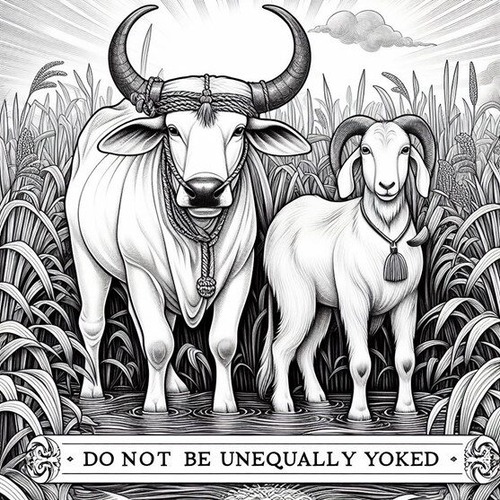Unequally Yoked in Marriage: Recipe for Disaster?
The concept of being “unequally yoked” comes from 2 Corinthians 6:14, where the Bible warns believers against binding themselves together with unbelievers. The Greek word used here refers to an “unequal” or “different” yoking of animals such as oxen—mismatching them in terms of size and strength would make life and workload difficult for both.
When it comes to marriage, being unequally yoked refers to a Christian being married to a non-Christian. The Bible instructs Christ-followers to avoid spiritually mismatched unions (being unequally yoked) because of the inevitable tensions, conflicts, and risks of compromise that will arise.
Why the Prohibition? Marriage is a profound, sacred covenant that God intended to be a spiritual and physical union (Genesis 2:24). When a believer marries a non-believer, the spiritual disconnect can cause significant strain and challenges for both parties:
- Differing Worldviews & Values: As a Christian married to a non-Christian, you will have fundamentally different beliefs, priorities, and moral/ethical foundations underpinning your life philosophies. This clash of worldviews will inevitably lead to conflicts on various issues.
- Challenges in Raising Children: When you’re blessed with children, you as parents will have divergent views on how to raise and spiritually nurture them. Disagreements over matters such as discipline, moral training, and religious instruction will be a constant battleground.
- Spiritual Intimacy Challenge: Marriage is meant to be a holy, intimate relationship that reflects Christ’s union with the Church (Ephesians 5:31-32). An unequally yoked marriage lacks the spiritual intimacy and shared spiritual walk that believers yearn for and should have.
- Compromise Risks: The unbelieving spouse may subtly (or overtly) encourage compromises in the Christian’s faith over time. There is a risk of being spiritually pulled away from a vibrant relationship with Christ.
- Short-term Union: Ultimately, unless both spouses are believers, the family cannot experience the fullness of being united in Christ for eternity. Death will tragically part them forever if one spouse remains an unbeliever.
The Bible’s wisdom here is clear—being unequally yoked will inevitably produce avoidable strife, conflict, spiritual decline, and eternal separation. While God can certainly overcome such marital divides through supernatural grace, the instruction to not enter into such an unequal spiritual bond remains paramount.
The “Can’t I Win Them Over” Fallacy: Some believers may rationalize being unequally yoked, with thoughts such as “Wouldn’t it actually help enlarge God’s Kingdom if I marry an unbeliever and eventually win him/her over to Christ?” This line of reasoning, though well-meaning, is often misguided folly.
The unfortunate reality is the spiritual “traffic” is frequently in the opposite direction. Rather than the unbelieving spouse being won over, it’s more likely you as a Christian spouse will forever be pulled away from fervent faith.
After all, if you’re already compromising on the clear Biblical directive against being unequally yoked at the very start, it reveals a willingness to overlook Scripture’s authority so you can have your own desires. This spiritual compromising heart-posture then becomes fertile ground for further backsliding once marriage strains arise.
When two are unequally yoked, it’s typically the Christian who does most of the continual compromising on matters of faith, ethics, priorities and values to avoid constant conflict. The tragic regression often causes believers to get spiritually malnourished and paralyzed in being salt and light. So while the noble aim is to see your spouse radically transformed by the gospel, the more likely outcome is fielding years of spiritual attack, drift and weakening of your own convictions. You may be entering into an unequal yoke with good intentions, but remember, you’re doing so at great expense: one of clear disobedience.
Sobering Consequences: Wilfully disobeying Scripture’s clear teaching by marrying an unbeliever often carries severe spiritual consequences. Beyond the marital strains, it puts one’s walk with Christ at risk and can lead to a gradual hardening of one’s spiritual sensitivity and convictions over time.
The grave error unravels relationships—with the Lord, one’s Christian family/community, and even one’s own children who may be drawn from the faith. While God’s mercy abounds, repeated conscious defiance can ultimately lead to spiritual shipwreck (1 Timothy 1:19).
Avoiding the Pitfall: The wisest path is to heed Scripture’s warnings against being unequally yoked from the start. If you’re a single believer, seriously consider marital relationships only with those who share your faith and commitment to Christ. Lay this godly foundation from the outset.
However, if you have entered an unequally yoked marriage before knowing better, take courage! While immensely challenging, some have witnessed the amazing testimony of their unbelieving spouse being drawn to Christ through years of steadfast prayer, love and Christlike witness (1 Peter 3:1-2).
Ultimately, the principle is clear—being equally yoked spiritually is critical for a marriage to glorify God and withstand life’s inevitable storms united in faith. Hold fast to this timeless wisdom when looking out for your future spouse. Your obedience will be honoured, and your marriage blessed.
Related Reads:
Editor's Pick

The Throne-Room Vision: Who Did Isaiah See?
The scene is unforgettable: Isaiah stands in the temple, and suddenly the veil between heaven and earth tears open. He [...]

The Angel of the Lord: Can We Be Certain It Was Christ All Along?
Throughout the Old Testament, a mysterious figure appears: the Angel of the LORD. He speaks as God, bears God’s name, [...]

The Doctrine of Providence: Does God Really Govern All Things?
You’re sitting in the doctor’s office when the diagnosis lands like a thunderclap. Your mind races: Why this? Why now? [...]
SUPPORT US:
Feel the Holy Spirit's gentle nudge to partner with us?
Donate Online:
Account Name: TRUTHS TO DIE FOR FOUNDATION
Account Number: 10243565459
Bank IFSC: IDFB0043391
Bank Name: IDFC FIRST BANK






